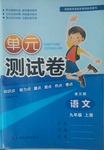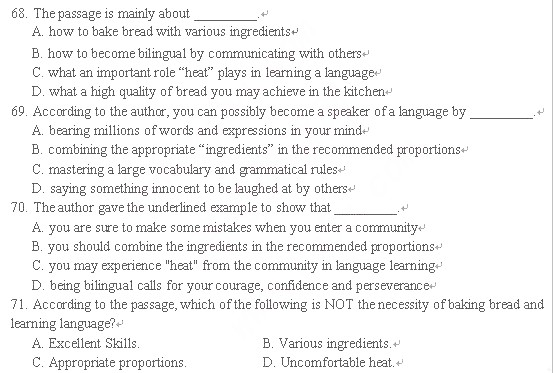
| A.help those in wheelchairs gain self-confidence |
B.share his experience of acting as a wheelch air user air user |
| C.ask people to show sympathy for those in wheelchairs |
| D.call on people to respect and help those in wheelchairs |
| A.bad road conditions | B.poor attitudes of ordinary people |
| C.terrible medical service | D.bad weather |
| A.A wheelchair user may feel offended when you do not address him or her directly. |
| B.Assistants in big stores are usually kind to people in wheelchairs. |
| C.People in wheelchairs should fight for fair treatment. |
| D.People in wheelchairs are usually hard to get along with. |
| A.Look down on a person in a wheelchair. |
| B.Speak to a person in a wheelchair in a sing-song voice. |
| C.Treat a person in a wheelchair as you would any other person. |
| D.Offer assistance to a person in a wheelchair without asking for permission. |
 阳光试卷单元测试卷系列答案
阳光试卷单元测试卷系列答案科目:高中英语 来源:不详 题型:完形填空
 first year in college,she went
first year in college,she went  back to the personnel manager.He said,“You are 44 ,aren’t you? I think I have a 45 for you as a teacher’s assistant.This opportunity deals with children who are mentally challenged with little or no chance of 46 ”Mom accepted the opportunity very 47
back to the personnel manager.He said,“You are 44 ,aren’t you? I think I have a 45 for you as a teacher’s assistant.This opportunity deals with children who are mentally challenged with little or no chance of 46 ”Mom accepted the opportunity very 47 rsonnel manager and the principal 49 in her classroom.The principal said.“We have watched how you 50 the children and how they
rsonnel manager and the principal 49 in her classroom.The principal said.“We have watched how you 50 the children and how they  communicate with you and admire your hard.working 51 over the last five years.We are all in agreement that you 52 be the teacher of this class.”
communicate with you and admire your hard.working 51 over the last five years.We are all in agreement that you 52 be the teacher of this class.”| 小题1: |
|
| 小题2: |
|
| 小题3: |
|
| 小题4: |
|
| 小题5: |
|
| 小题6: |
|
| 小题7: |
|
| 小题8: |
|
| 小题9: |
|
| 小题10: |
|
| 小题11: |
|
| 小题12: |
|
| 小题13: |
|
| 小题14: |
|
| 小题15: |
|
| 小题16: |
|
| 小题17: |
|
| 小题18: |
|
| 小题19: |
|
| 小题20: |
|
查看答案和解析>>
科目:高中英语 来源:不详 题型:完形填空
| 小题1: |
|
| 小题2: |
|
| 小题3: |
|
| 小题4: |
|
| 小题5: |
|
| 小题6: |
|
| 小题7: |
|
| 小题8: |
|
| 小题9: |
|
| 小题10: |
|
| 小题11: |
|
| 小题12: |
|
| 小题13: |
|
| 小题14: |
|
| 小题15: |
|
| 小题16: |
|
| 小题17: |
|
| 小题18: |
|
| 小题19: |
|
| 小题20: |
|
查看答案和解析>>
科目:高中英语 来源:不详 题型:完形填空
| 小题1: |
|
| 小题2: |
|
| 小题3: |
|
| 小题4: |
|
| 小题5: |
|
| 小题6: |
|
| 小题7: |
|
| 小题8: |
|
| 小题9: |
|
| 小题10: |
|
| 小题11: |
|
| 小题12: |
|
| 小题13: |
|
| 小题14: |
|
| 小题15: |
|
| 小题16: |
|
| 小题17: |
|
| 小题18: |
|
| 小题19: |
|
| 小题20: |
|
查看答案和解析>>
科目:高中英语 来源:不详 题型:阅读理解
 rom other writers, but the intensity(强度)of his imagination and language made the plays his own. While many plays by other writers of his time have been forgotten, Shakespeare and his art live on.
rom other writers, but the intensity(强度)of his imagination and language made the plays his own. While many plays by other writers of his time have been forgotten, Shakespeare and his art live on.| A.Many of Shakespeare's works were influenced by earlier writings. |
| B.Shakespeare was hardworking when he was a student. |
| C.The experience of living in London helped a lot with Shakespeare's works. |
| D.Shakespeare became rich later because of the popularity of his works. |
| A."King Lear" | B."The Comedy of Errors" | C."Macbeth" | D."Othello" |
| A.Because there were so few people writing plays in his time. |
| B.Because he produced too many works that nobody else could do. |
| C.Because he was a rich and influential person of his time. |
| D.Because his works were rich in imagination and language. |
| A.the English language | B.paintings | C.television | D.music and dance |
| A.an introduction to Shakespeare’s life and his works |
| B.the main features and styles of Shakespeare's plays |
| C.how culture influenced Shakespeare and he influenced culture. |
| D.Shakespeare’s greatest influence on the world culture. |
查看答案和解析>>
科目:高中英语 来源:不详 题型:阅读理解
| A.to enter the “real world” after graduation |
| B.to go and work in a foreign country |
| C.to settle in a different country |
| D.to find a job in the home country |
| A.it is a beautiful country and people there are nice |
| B.England is spoken there and it is easy to find a job |
| C.it is in Europe, not far from her own country |
| D.the BUNAC office is located there |
| A.getting a job | B.buying health insurance |
| C.traveling around Britain | D.finding a place to live |
| A.A Trip to Britain | B.What I Want to Be |
| C.Living in a Different Country | D.My Work Experience |
查看答案和解析>>
科目:高中英语 来源:不详 题型:阅读理解

查看答案和解析>>
科目:高中英语 来源:不详 题型:阅读理解
| A.show his interest in exaggerated words |
| B.prove that exaggerated words are widely used |
| C.blame the restaurant for using exaggerated words |
| D.tell us the food in the restaurant is extremely good |
| A.He has gained height and is now a tall man. |
| B.He likes following the fashion in clothing. |
| C.His weight is getting greater and greater. |
| D.The size of his T-shirt is described in exaggerated words. |
| A.they are not satisfied with being normal |
| B.they don’t want to be looked down upon by others |
| C.they want to be different from others |
| D.they are brave in telling their true feelings |
| A.fantastic | B.perfect | C.OK | D.absolutely |
查看答案和解析>>
科目:高中英语 来源:不详 题型:阅读理解
 n Rio Piedras, Puerto Rico. My first job was to drive the oxen(牛) that ploughed the cane fields. I would walk behind an ox, guiding him with a broomstick. For $ 1 a day, I worked eight hours straight, with no food breaks.
n Rio Piedras, Puerto Rico. My first job was to drive the oxen(牛) that ploughed the cane fields. I would walk behind an ox, guiding him with a broomstick. For $ 1 a day, I worked eight hours straight, with no food breaks. owners were always watching us, I had to be on time every day and work as hard as I could. I’ve never been late for any job since. I also learned about being respectful and faithful to the people you work for. More important, I earned my pay; it never entered my mind to say I was sick just because I didn’t want to work.
owners were always watching us, I had to be on time every day and work as hard as I could. I’ve never been late for any job since. I also learned about being respectful and faithful to the people you work for. More important, I earned my pay; it never entered my mind to say I was sick just because I didn’t want to work. b. Our family needed every dollar we could make because my father never earned more than $ 18 a week. Our home was a three-room wood shack with a dirty floor and no toilet. Nothin
b. Our family needed every dollar we could make because my father never earned more than $ 18 a week. Our home was a three-room wood shack with a dirty floor and no toilet. Nothin g made me prouder than bringing home money to help my mother, father, two brothers and three sisters. This gave me self-esteem(自尊心), one of the most important things a person can have.
g made me prouder than bringing home money to help my mother, father, two brothers and three sisters. This gave me self-esteem(自尊心), one of the most important things a person can have.| A.difficult | B.boring | C.interesting | D.unusual |
| A.he should work for those who he liked most |
| B.he should work longer than what he was expected |
| C.he should never fail to say hello to his owner |
| D.he should be respectful and faithful to the people he worked for |
| A.Having a family of eight people |
| B.Owning his own golf course |
| C.Bringing money back home to help the family |
| D.Helping his father with the work on the plantation |
| A.He wanted to be a successful golfer. |
| B.He wanted to run a golf course near his house. |
| C.He was satisfied with the job he got on a plantation. |
D.He wanted to make money by guiding oxen with a brooms tick. tick. |
查看答案和解析>>
湖北省互联网违法和不良信息举报平台 | 网上有害信息举报专区 | 电信诈骗举报专区 | 涉历史虚无主义有害信息举报专区 | 涉企侵权举报专区
违法和不良信息举报电话:027-86699610 举报邮箱:58377363@163.com